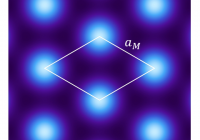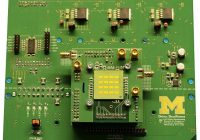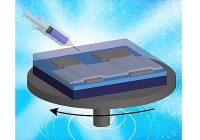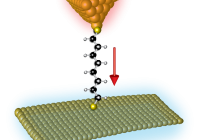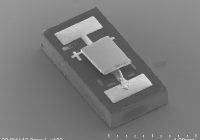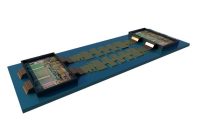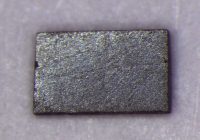Tag Archives: microchip
MORPHEUS vs. Everybody
First digital single-chip millimeter-wave beamformer will exploit 5G capabilities
The first fully-integrated single-chip digital millimeter-wave (MMW) beamformer, created by electrical and computer engineers at U-M, opens up new possibilities in high-frequency 5G communications. The technology could be used to improve vehicle-to-vehicle communication, autonomous driving, satellite internet, and national defense, to name a few. Beamforming allows a device that is transmitting signals to point them in a particular… Read More »
Tracking monarch butterfly migration with the world’s smallest computer
In a project funded by National Geographic, electrical and computer engineering researchers are teaming up with the department of Ecology and Evolutionary Biology to advance our understanding of monarch butterfly migration with the most ambitious iteration of the Michigan Micro Mote yet. The M3, created by David Blaauw, professor of electrical engineering and computer science, and several other… Read More »
Hardware model checker takes gold at international competition
Work by Karem Sakallah, professor of computer science and engineering, and PhD student Aman Goel took first place at the 11th edition of the Hardware Model Checking Competition, an event hosted by the Conference on Formal Methods in Computer-Aided Design to determine the best current method for formally verifying a hardware system. The event featured nine categories composed… Read More »
Taking transistor arrays into the third dimension
Silicon integrated circuits, which are used in computer processors, are approaching the maximum feasible density of transistors on a single chip—at least, in two-dimensional arrays. Now, a team of engineers at U-M have stacked a second layer of transistors directly atop a state-of-the-art silicon chip. They propose that their design could remove the need for a second chip… Read More »
A step closer toward molecular computers
Heat transfer through a single molecule has been measured for the first time by an international team of researchers led by the University of Michigan. This could be a step toward molecular computing—building circuits up from molecules rather than carving them out of silicon as a way to max out Moore’s Law and make the most powerful conventional… Read More »
Unhackable: New chip stops attacks before they start
A new computer processor architecture developed at U-M could usher in a future where computers proactively defend against threats, rendering the current electronic security model of bugs and patches obsolete. Called MORPHEUS, the chip blocks potential attacks by encrypting and randomly reshuffling key bits of its own code and data 20 times per second—infinitely faster than a human… Read More »
Running an LED in reverse could cool future computers
In a finding that runs counter to a common assumption in physics, researchers at U-M ran a light emitting diode (LED) with electrodes reversed in order to cool another device mere nanometers away. The approach could lead to new solid-state cooling technology for future microprocessors. “We have demonstrated a second method for using photons to cool devices,” said… Read More »
Bridging the “last centimeter barrier” in electronic communications
Michigan Engineering researchers are addressing a performance bottleneck that currently exists in the information transfer between electronic chips located a few centimeters apart in a computing system. Led by electrical engineering professor Pinaki Mazumder, their work – dubbed the “last centimeter barrier” – will enable a new generation of electronic systems with ultra high speed data transfers. Electronic chips… Read More »
Computing pioneer to receive honorary U-M doctorate
Forty years after her paradigm-shifting work in microchip design and education, Lynn Conway will receive an honorary Doctor of Science degree at Winter Commencement 2018 on the University of Michigan’s Ann Arbor campus. Conway, U-M professor emerita of electrical engineering and computer science, is one of four respected leaders in the fields of engineering, English, business and academic… Read More »
U-M physicist researches material that could aid quantum computing
Quantum materials are a type of substance that could be many times more efficient at conducting electricity through smartphones than the commonly used conductor silicon—if only researchers can crack how the stuff works. U-M physicist Lu Li has gotten one step closer with detailing the conductive properties of a novel quantum material called ytterbium dodecaboride that works as both… Read More »
Intel processor vulnerability could put millions of PCs at risk
Researchers at U-M were part of a group that discovered a new processor vulnerability that could potentially put secure information at risk in any Intel-based PC manufactured since 2008. It could affect users who rely on a digital lockbox feature known as Intel Software Guard Extensions, or SGX, as well as those who utilize common cloud-based services,… Read More »
U-M gets $16.7M for advanced computing projects
U-M engineering researchers have received more than $16.7 million from a Defense Advanced Research Projects Agency initiative to push microelectronics beyond Moore’s Law—the transistor scaling that has allowed for 50 years of rapid progress in electronics. DARPA’s Electronics Resurgence Initiative is a $75 million effort to jumpstart innovation in the field. The funded projects at U-M include: An open-source… Read More »

